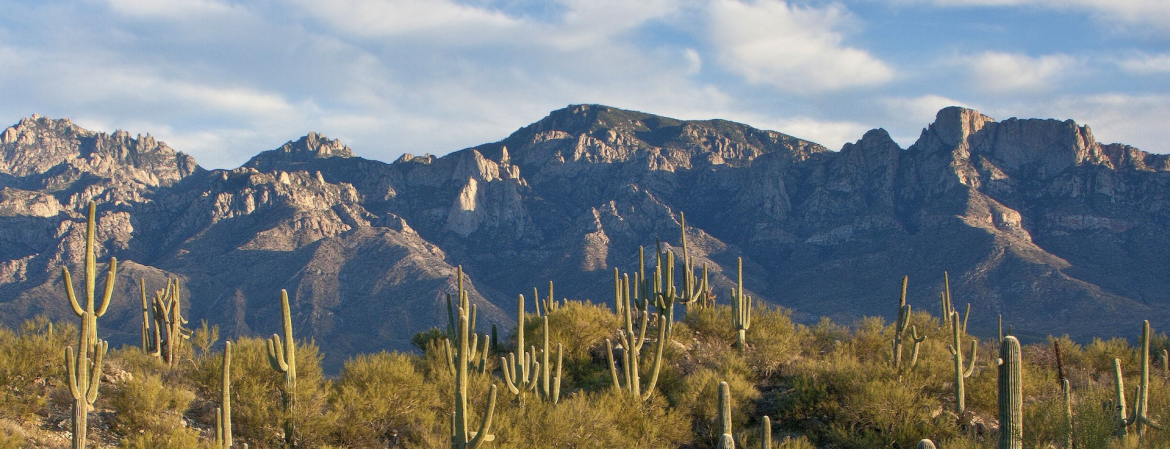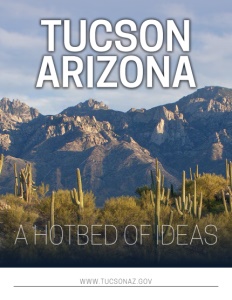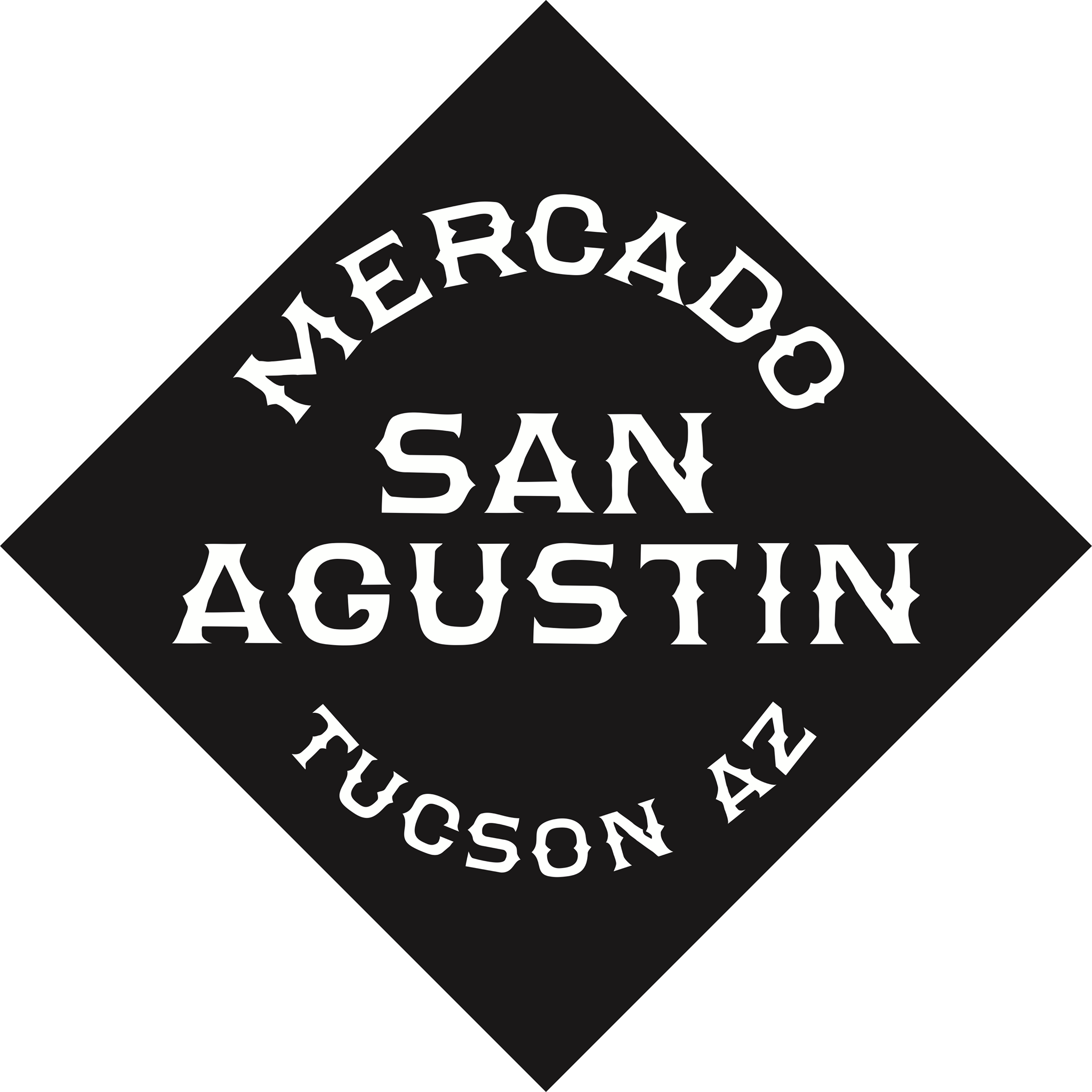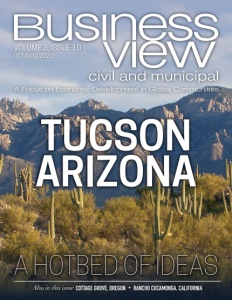Tucson, Arizona
A hotbed of ideas
Business View interviews Barbra Coffee, Tucson, Arizona Economic Initiatives Director, for our focus on Economic Growth & Resilience in U.S. Cities
The second largest city in the State of Arizona, Tucson has a population of more than 540,000 people and is the county seat of Pima County. Located only 60 miles north of the U.S./Mexican border, and 108 miles southeast of Phoenix, the City of Tucson offers an attractive option for larger industries, while also supporting small businesses and entrepreneurs.
Rich with history, Tucson is a city that understands its identity, showcasing this through a diverse range of arts and cultural experiences. Economic Initiatives Director Barbra Coffee shares, “When you’re on the ground in Tucson, you have a very distinct notion of where you are. Our community resonates with its history and its heritage. There’s 4,000 years of history here in Tucson, and it is still evident in our architecture and in our food.”
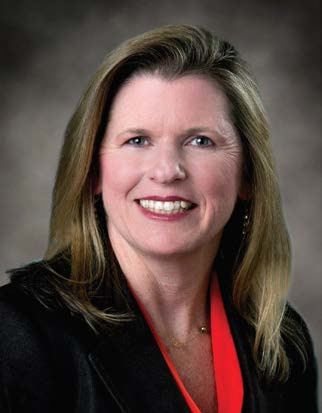
Barbra Coffee, Economic Initiatives Director
The first North American city to be designated a UNESCO City of Gastronomy, Tucson promotes a tradition of agriculture and food, with a variety of programs in place to support independent restaurants and food-based businesses. “We use and we leverage that designation by UNESCO to attract people,” says Coffee. “Visitors will seek out foodie towns, they will seek out experiences, they will come to Tucson and find a whole lot of opportunity around festivals, around food, and local restaurants that are independently owned and operated.”
Blessed with a vibrant downtown brimming with diverse housing and business offerings, Tucson has all the requirements for urban living in its city core. “We’re a mid-size downtown. It’s an urban center, but it’s not too big, it’s not too small, it has the right mix of activity. We are seeing a lot more residents downtown in terms of multifamily, high-rises, everything from luxury apartment to student housing,” Coffee describes. Sharing that the University of Tucson is only minutes from downtown, she adds, “We have a modern streetcar that loops and connects the university to the center of downtown, to the government buildings, and to the west side of I-10 to the Mercado district.”
A wide selection of housing is available throughout the city, geared to the differing needs of the community. While many of these residences have historical and architectural significance, many also showcase the beauty of the foothills, with eye catching views of the Tuscan Mountains and the Catalinas. Coffee relays, “We do protect a lot of our structures. You’ll have beautiful historic homes and small bungalows, but then as you go outward, you’ll get into our suburban areas which are newer construction single family homes with larger lot sizes. There’s a lot of Tucson homes that are single storey on large lots and allow for a great outdoor lifestyle.”
Noting that the community offers variety in their housing stock, she suggests, “Tucson is very affordable – especially considering our neighbors to the west in California, we are quite a bargain. That certainly helps us attract people who are looking for a little more house for their money.” With efforts underway to increase affordable housing in the city, she adds, “Having the housing options to create a balanced community is very important. We have very intentional efforts underway to develop housing, through our Housing and Community Development here at the City of Tucson.”
Climate action and sustainability investments are a high priority in Tucson, with Mayor Regina Romero leading the Tucson Million Trees initiative, which promises to plant one million trees by 2030. The city is committed to carbon neutrality by 2030 and a zero-waste action plan. Electric vehicle readiness is also underway, with Tucson adopting an EV roadmap in order to assist in the eventual switch to electric fleets on the city side, while also encouraging residents and businesses to do the same. “We are proponents of that and I think it will help us when we think about economic development because a lot of activity is happening throughout the state in electric vehicles,” asserts Coffee. “Companies that want to align with a community like ours, who are committed to that, would see Tucson as a great place for them to do business.” Reporting that solar panels have been installed on all city owned facilities as another effort to be more sustainable, she maintains, “We recognize climate change and we are trying to do our part.”
On the topic of valued partnerships Coffee says, “We don’t do anything in a silo, especially from the hat I wear, which is economic development. All of our partners are extremely important.” Mentioning Pima Community College and the University of Arizona as key partners in education and workforce development, she shares that Pima is investing more than $100 million into setting up what they call Centers of Excellence. “They opened a new Automotive Technology Center last year, and this year are about to open an advanced manufacturing facility that really brings private industry in. It opens doors to customized training and programs that benefit our industry that is already here, or that might come here. It also benefits those trainees that are looking to access those jobs.”
As a city known for its non-profit groups, Coffee shares that organizations such as the YWCA Women’s Business Center and StartUp Tucson are dedicated to helping entrepreneurs to succeed, while lenders such as Community Investment Corporation and Growth Partners Arizona are providing access to financial resources. Coffee elaborates, “I think about our economic development partners at Pima County. Sun Corridor is our regional group and groups like the Arizona Commerce Authority, have programs and ability to assist businesses as they are looking to locate and grow here in the community. The list goes on and on for sure.”
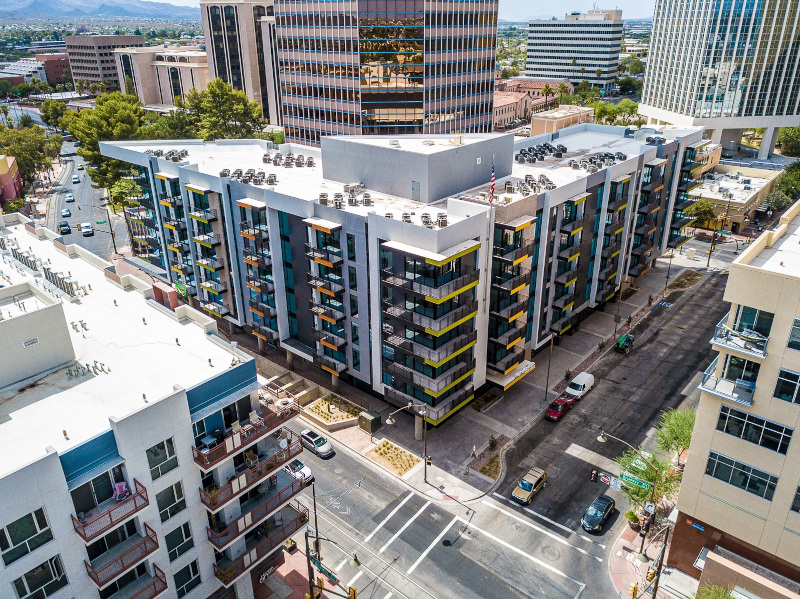
The completion of a comprehensive Economic Development Strategic Plan has led the City of Tucson to identify target industry sectors. Coffee recounts, “We are already an important location for aerospace and defense related activity, and anything happening with space. We are home to Raytheon and their missiles defense systems are headquartered here. They continue to grow and they are our largest private employer with almost 14,000 people employed in Tucson.” Adopting the title of ‘Optics Valley’, due to their high concentration of optics and photonics industries, the city is also focused on continued growth in that sector. “The university is at the center of that in their world-renowned College of Optical Sciences,” Coffee acknowledges. “As you can imagine, that crosses industry sectors. There are applications of that in lots of manufacturing. We are very excited about the growth in that area.”
Tucson will also continue to focus on bioscience and healthcare, as well as transportation, logistics, and manufacturing. “We know we are a prime location for logistics and transportation activity, distribution, that kind of thing, because of our location in the southwest on I-10, with I-19 just 50 minutes to the border of northern Mexico,” says Coffee. “That is a natural for us, to just continue to lure those high wage industry opportunities so that our citizens can benefit from that.”
The University of Arizona’s Tech Parks Arizona have three campuses in the region, with the largest having 200 companies and 6000 employees. These campuses are built to attract and retain technology companies in the city, while also supporting emerging companies through their Center for Innovation. “The growth of that sends a strong message that we are a community that is oriented around supporting innovation. And we’ll certainly have space for companies to come together, to collaborate and work with the university in order to achieve their goals,” says Coffee.
Looking to the future, she relays, “We have these large tracts of land, almost 2000 acres, along I-10 that is transitioning for industrial use. It’s definitely a prime location for manufacturing activity. Arizona is seeing its share of companies looking at battery manufacturing, at electric vehicle manufacturing, the semiconductor industry has shown up strong in Phoenix and Tucson is certainly poised to see some of that as well.”
Small business will also be a priority for the city going forward, with Tucson bringing on small business navigators, specifically to work with micro enterprises. “Those independently owned and operated businesses are the lifeblood of Tucson,” says Coffee. Another city initiative partners large employers with smaller local businesses in the hopes of developing partnerships and vendor opportunities.
As a vibrant city full of possibility, Tucson is ready to embrace new opportunities. In terms of what comes next, Coffee offers, “We want to continue to be resilient, and open to new ideas, so that we can continue moving forward.”
AT A GLANCE
Tucson, Arizona
What: A vibrant city of 540,000
Where: Pima County, Arizona
Website: www.tucsonaz.gov
